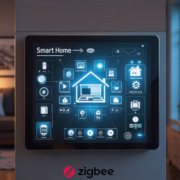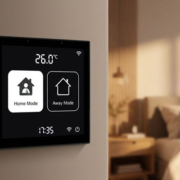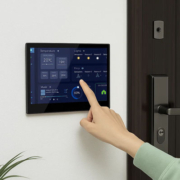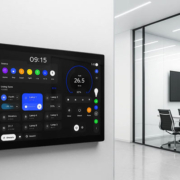What is a Smart Control Panel?
A smart control panel is an advanced user interface that allows users to centrally manage and automate various systems within a smart home, commercial building, or industrial environment. It integrates both hardware and software components to offer seamless control over lighting, HVAC, security, multimedia, and other connected devices.
Key Features of a Smart Control Panel
- Touchscreen Interface
Most modern smart control panels feature a responsive touchscreen interface that provides an intuitive, user-friendly experience. Users can easily access controls, scenes, and system settings with a simple tap or swipe. - Multi-Protocol Compatibility
A high-quality smart panel typically supports multiple communication protocols such as RS485, Modbus, Zigbee, KNX, or Wi-Fi/Ethernet, enabling integration with a wide range of devices and platforms. - Centralized Control
Instead of managing devices individually through different apps or remotes, a smart control panel consolidates these functions into one convenient interface — acting as a central hub for smart living or building management. - Automation & Scheduling
Many panels support automation routines or “scenes.” For example, users can schedule lights to turn off at bedtime or set the HVAC system to adjust temperatures based on occupancy or time of day. - Security Monitoring
Integrated with security systems, smart control panels can display real-time camera feeds, send alerts, or control door locks and alarms, enhancing the safety of residential and commercial properties. - Customizable UI and OEM/ODM Options
For professional or enterprise-level use, some providers offer OEM/ODM customization — allowing businesses to adapt the interface design, hardware configuration, and operating system to match their project needs.
Applications of Smart Control Panels
- Smart Homes: For controlling lighting, curtains, air conditioning, music, door locks, and more.
- Hotels: Guest room management systems (GRMS), access control, and room environment control.
- Offices: Centralized meeting room scheduling, lighting, and AV system control.
- Retail and Commercial Spaces: Scene control, signage display integration, and environmental management.
- Industrial Automation: Touch HMI panels to control machinery and monitor factory operations.
Benefits of Using a Smart Control Panel
- Convenience: Simplifies complex controls into a single interface.
- Efficiency: Saves energy through automation and smarter device coordination.
- Scalability: Compatible with expanding smart ecosystems and supports firmware updates.
- Aesthetics: Wall-mounted panels with sleek designs enhance interior design.
Example: Portworld Smart Panels
Portworld offers a range of Android-based smart control panels, from 5.5-inch to 10-inch models, equipped with PoE, RS485, Wi-Fi, and Bluetooth. These panels run on RK3566 quad-core processors and support multi-protocol integration, making them ideal for smart homes, hotels, and industrial automation projects. Full OEM/ODM customization is available to meet branding and system integration needs.










